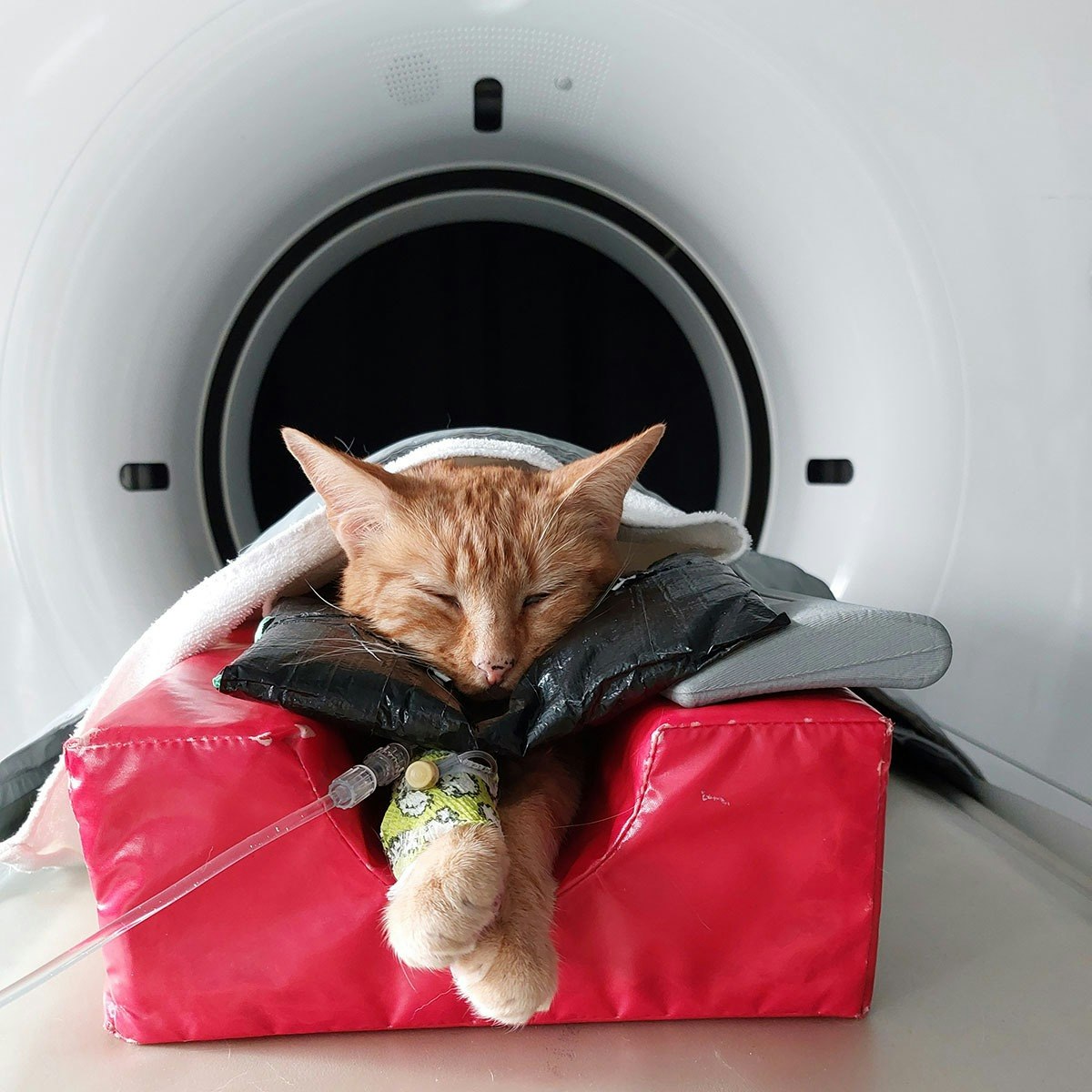
Why is the experience of going to the vets a negative one for some animals? Is it the anticipated pain, the way the place smells, the colour of the waiting room, the noises coming from the consulting room, or something else?
What can vets, vet nurses, animal carers, and owners do to ensure that the welfare of the animal is supported at every stage of the clinical visit (from transportation, waiting area, examination, operating room, and recovery)?
Read more
Why is the experience of going to the vets a negative one for some animals? Is it the anticipated pain, the way the place smells, the colour of the waiting room, the noises coming from the consulting room, or something else?
What can vets, vet nurses, animal carers, and owners do to ensure that the welfare of the animal is supported at every stage of the clinical visit (from transportation, waiting area, examination, operating room, and recovery)?
Why is the experience of going to the vets a negative one for some animals? Is it the anticipated pain, the way the place smells, the colour of the waiting room, the noises coming from the consulting room, or something else?
What can vets, vet nurses, animal carers, and owners do to ensure that the welfare of the animal is supported at every stage of the clinical visit (from transportation, waiting area, examination, operating room, and recovery)?
In this course, leading experts in the field of animal behaviour, welfare, veterinary medicine, and industry provide an insight into practical approaches and considerations for improving and maintaining animal welfare in the clinic.
Here's a deal for you
What's inside
Syllabus
Animal Behaviour and Welfare in the Clinic
In this first week, we look at animal welfare as a science, how we can use evidence to make objective measures to determine whether an animal is experiencing positive or negative welfare, and why it is so important in the veterinary clinic. We’ll also look at what constitutes normal cat, dog, and rabbit behaviour, what motivates canine aggression and what we can do if an owner reports aggressive behaviour in their dog.
Read more
Syllabus
Good to know
Save this course
Activities
Review Veterinary Terminology and Anatomy
Show steps
A solid understanding of veterinary terminology and anatomy is essential for effective communication and understanding in this field.
Show steps
-
Review your notes or textbooks from previous courses
-
Use online resources such as flashcards or quiz websites to test your knowledge
-
Attend a refresher workshop or seminar on veterinary terminology and anatomy
Explore Online Resources on Animal Welfare
Show steps
There are many excellent online resources available that can supplement your learning and provide additional insights into animal welfare.
Browse courses on
Animal Welfare
Show steps
-
Search for websites, articles, and videos on animal welfare topics
-
Follow reputable organizations and experts on social media for updates and resources
-
Attend webinars or online courses on animal welfare
Volunteer at an Animal Welfare Organization
Show steps
Volunteering at an animal welfare organization can provide you with valuable hands-on experience and insights into animal care and welfare.
Browse courses on
Animal Welfare
Show steps
-
Identify an animal welfare organization that aligns with your interests
-
Contact the organization and inquire about volunteer opportunities
-
Participate in volunteer activities such as animal care, enrichment, or educational programs
Five other activities
Expand to see all activities and additional details
Show all eight activities
Review Animal Behavior Concepts
Show steps
By reviewing fundamental animal behavior concepts, you can strengthen your knowledge and identify areas where you need additional support.
Browse courses on
Animal Behavior
Show steps
-
Read relevant textbooks or online resources on animal behavior
-
Attend workshops or seminars on animal behavior
-
Observe and analyze animal behavior in different contexts, such as at a zoo or animal shelter
Practice Handling and Examining Animals
Show steps
Practicing animal handling and examination techniques can improve your comfort and proficiency in these essential tasks.
Browse courses on
Clinical Skills
Show steps
-
Seek opportunities to practice handling and examining animals under the supervision of a veterinarian or experienced technician
-
Volunteer at a veterinary clinic or animal shelter to gain practical experience
-
Enroll in a workshop or course on animal handling and examination techniques
Participate in Case Study Discussions
Show steps
Engaging in case study discussions can broaden your perspective, challenge your assumptions, and enhance your problem-solving skills.
Browse courses on
Case Studies
Show steps
-
Join or form a study group with classmates or colleagues
-
Select case studies that are relevant to the course material
-
Discuss the cases, sharing your perspectives and insights
-
Reflect on the discussions and identify areas for further learning
Develop a Welfare Assessment Protocol
Show steps
Creating a welfare assessment protocol can enhance your ability to objectively evaluate animal welfare and ensure consistent standards of care.
Show steps
-
Review existing animal welfare assessment protocols and guidelines
-
Consult with experts in animal behavior and veterinary medicine
-
Develop a protocol that is tailored to the specific needs of your practice
-
Implement and evaluate the protocol to ensure its effectiveness
Compile a Resource List on Animal Welfare
Show steps
Creating a resource list can help you organize and retain information on animal welfare, making it easily accessible for future reference.
Browse courses on
Animal Welfare
Show steps
-
Gather resources from various sources, such as books, articles, websites, and videos
-
Organize the resources into categories or topics
-
Create a document or online platform to share the resource list
Review Veterinary Terminology and Anatomy
Show steps
A solid understanding of veterinary terminology and anatomy is essential for effective communication and understanding in this field.
Show steps
- Review your notes or textbooks from previous courses
- Use online resources such as flashcards or quiz websites to test your knowledge
- Attend a refresher workshop or seminar on veterinary terminology and anatomy
Explore Online Resources on Animal Welfare
Show steps
There are many excellent online resources available that can supplement your learning and provide additional insights into animal welfare.
Browse courses on
Animal Welfare
Show steps
- Search for websites, articles, and videos on animal welfare topics
- Follow reputable organizations and experts on social media for updates and resources
- Attend webinars or online courses on animal welfare
Volunteer at an Animal Welfare Organization
Show steps
Volunteering at an animal welfare organization can provide you with valuable hands-on experience and insights into animal care and welfare.
Browse courses on
Animal Welfare
Show steps
- Identify an animal welfare organization that aligns with your interests
- Contact the organization and inquire about volunteer opportunities
- Participate in volunteer activities such as animal care, enrichment, or educational programs
Review Animal Behavior Concepts
Show steps
By reviewing fundamental animal behavior concepts, you can strengthen your knowledge and identify areas where you need additional support.
Browse courses on
Animal Behavior
Show steps
- Read relevant textbooks or online resources on animal behavior
- Attend workshops or seminars on animal behavior
- Observe and analyze animal behavior in different contexts, such as at a zoo or animal shelter
Practice Handling and Examining Animals
Show steps
Practicing animal handling and examination techniques can improve your comfort and proficiency in these essential tasks.
Browse courses on
Clinical Skills
Show steps
- Seek opportunities to practice handling and examining animals under the supervision of a veterinarian or experienced technician
- Volunteer at a veterinary clinic or animal shelter to gain practical experience
- Enroll in a workshop or course on animal handling and examination techniques
Participate in Case Study Discussions
Show steps
Engaging in case study discussions can broaden your perspective, challenge your assumptions, and enhance your problem-solving skills.
Browse courses on
Case Studies
Show steps
- Join or form a study group with classmates or colleagues
- Select case studies that are relevant to the course material
- Discuss the cases, sharing your perspectives and insights
- Reflect on the discussions and identify areas for further learning
Develop a Welfare Assessment Protocol
Show steps
Creating a welfare assessment protocol can enhance your ability to objectively evaluate animal welfare and ensure consistent standards of care.
Show steps
- Review existing animal welfare assessment protocols and guidelines
- Consult with experts in animal behavior and veterinary medicine
- Develop a protocol that is tailored to the specific needs of your practice
- Implement and evaluate the protocol to ensure its effectiveness
Compile a Resource List on Animal Welfare
Show steps
Creating a resource list can help you organize and retain information on animal welfare, making it easily accessible for future reference.
Browse courses on
Animal Welfare
Show steps
- Gather resources from various sources, such as books, articles, websites, and videos
- Organize the resources into categories or topics
- Create a document or online platform to share the resource list
Career center
Veterinary Technician
Veterinarian
Animal Behaviorist
Animal Welfare Officer
Animal Caretaker
Animal Trainer
Pet Sitter
Dog Walker
Animal Shelter Volunteer
Zookeeper
Wildlife Rehabilitator
Animal Control Officer
Veterinary Sales Representative
Animal Advocate
Animal Rights Activist
Reading list
Share
Similar courses
OpenCourser helps millions of learners each year. People visit us to learn workspace skills, ace their exams, and nurture their curiosity.
Our extensive catalog contains over 50,000 courses and twice as many books. Browse by search, by topic, or even by career interests. We'll match you to the right resources quickly.
Find this site helpful? Tell a friend about us.
We're supported by our community of learners. When you purchase or subscribe to courses and programs or purchase books, we may earn a commission from our partners.
Your purchases help us maintain our catalog and keep our servers humming without ads.
Thank you for supporting OpenCourser.



